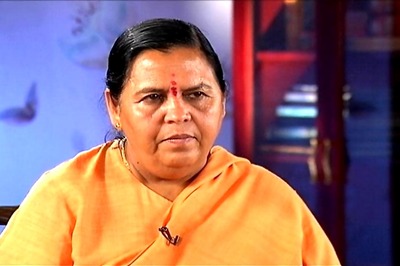
views
New Delhi: Pledging to take corruption head on, the Congress-led UPA tonight promised to punish the guilty in scams and assured the people that it would demonstrate through actions and not words what it meant.
As the coalition stepped into its third year in its second term, Prime Minister Manmohan Singh and UPA Chairperson Sonia Gandhi released "Government of the UPA: Report to the People" against the backdrop of corruption denting its image over the past several months.
Singh asserted that the guilty in scams will be punished through due process of law and steps will be taken to prevent them in future.
In her brief remarks in the report, Sonia said, "We will take the issue of corruption head on and demonstrate, through actions, and not words, that we mean what we say."
Significantly, the Prime Minister touched upon the issue of governance and corruption which, he said, has been the focus of a great deal of attention in 2010-11.
"The developments have caused many concerned citizens to worry about the state of governance and the pervasiveness of corruption.
"These are legitimate concerns and the UPA government is determined to take corrective action. We will punish those that are guilty through the due process of law," the Prime Minister said in the report which was released at a function at his residence to mark the second anniversary of UPA-II.
He also gave an assurance that the government would take steps "to prevent such developments in future".
The Prime Minister recalled the "conjunction of several developments" related to the 2G spectrum, procurement and contracting issues related to the Commonwealth Games and similar issues in state governments.
He said many of these issues have surfaced because of "our system of institutional oversight and a free press" and to that extend reflect the strength of the system.
Singh said, "We have initiated a number of measures to bring about systemic changes that would help in improving governance and curbing corruption and we hope to see quick results of these efforts."
The report card talks at length about the constitution of GoM on corruption in January this year and the introduction of the whistleblower bill among the measures initiated by the government to "tackle corruption".
It said that the terms of reference of the GoM include considering all legislative and administrative measures necessary to tackle corruption and improve transparency including relinquishing discretionary powers enjoyed by ministers at the Centre.
The Prime Minister said the government would leave no stone unturned in providing a clean and effective governance.
"We will leave no stone unturned in our efforts at providing clean and effective governance to the people," he said.
The report card emphasised that the ToR for the GOM also include fast-tracking of all cases of public servants accused of corruption and ensuring full transparency in public procurement and contracts, including enunciation of public procurement standards and a public procurement policy and introduction of an open and competitive system of exploiting natural resources.
"As one of the impediments felt in tackling corruption is lack of adequate protection to complainants, the Public Interest Disclosure and Protection to Persons Making the Disclosure Bill, 2010 (whistleblower bill) has been introduced in the Lok Sabha on 26th August 2010," it added.
Noting that India has ratified the United Nations Convention Against Corruption, it said, "with a view to ensuring full compliance with this Convention, the Prevention of Bribery of Foreign Public Officials and Officials of Public International Organisations Bill 2011 has been introduced in the Lok Sabha on 25th March 2011."
The report also covers many specific sectors like economic situation, agriculture, rural development, education, external and internal challenges, railways and environmental issues.
Touching on economic situation, the Prime Minister said that the country witnessed an unprecedented 8.5 per cent growth from 2004-05 to 2010-11 despite severe global financial crisis in this period and described the performance in agriculture as "particularly satisfying".
He said the financial crisis though slowed down the growth rate to 6.8 per cent in 2008-09, the economy rebounded with a "robust growth of 8.6 per cent in 2010-11."
Noting that food inflation was a major concern in the last financial year, the Prime Minister said his government took several measures to address the problem and continued its efforts in 2010-11 and "intend to do more in the future."
Admitting that there is a development deficit in areas affected by Left-wing extremism, the Prime Minister said his government was determined to address the shortcomings, while maintaining that the menace remains a "major problem."
In his foreword to the report, he said the UPA government has always adopted a nuanced approach in dealing with such extremism.
"We will deal firmly with extremism but we also recognize that there is a development deficit in the areas affected by Left-wing extremism and we are determined to address this deficit," Singh said.
He said the Government launched an Integrated Action Plan for accelerated development of 60 selected Tribal and Backward districts in 2010-11 which will be continued in 2011-12.
On external security, Singh said the government continued its focus on modernisation of armed forces and indigenous production of advanced weapon systems.
"During 2010-11, the indigenously developed light combat aircraft, Tejas, was cleared for operations by the Air Force and the first indigenously designed and built stealth frigate INS Shivalik was commissioned," Singh said.
He said two regiments of the indigenous main battle tank, Arjun, were operationalised by the Army.
The report noted that except for an attack on foreign tourists in Delhi and a low intensity bomb blast in Varanasi, there was no major terrorist incident in 2010-11.
Dwelling on the internal security measures taken by the government, the report said the National Investigation Agency has now been fully operationalised, with headquarters in Delhi and branch offices in Cyberabad and Guwahati.
"23 cases have been entrusted to it, out of which charge sheets have been filed in 15 cases," the report says.
On steps to counter Left-wing extremism, the report said these included setting up of a unified command in Chhattisgarh, West Bengal, Jharkhand and Orissa, and launching of a new scheme to assist state governments in construction or strengthening of 400 fortified police stations at Rs 2 crore each in Left-wing extremism-affected districts.

















Comments
0 comment